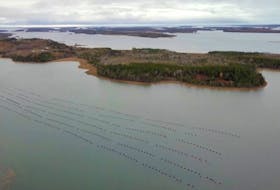EDITOR'S NOTE: This is the second in a five-part series. In Part 2, we examine the economic outlook for Canada and the Atlantic provinces in 2020 and beyond.
Canada is set to join a growing club of “super-aged societies,” with a new report calling the 2020s a “demographic time bomb” that will see seniors become a quarter of the country's population.
An RBC Economics report released Monday said the new decade could see profound changes, as the growing forces of demographic disruption and climate change collide with economic and technological trends.
“The loudest sound of the 2020s may be the ticking of the demographic time bomb,” the report released Monday said.
“Canadians are living longer and having fewer babies … working-age Canadians will feel the financial squeeze.”

The shrinking tax base will leave fewer to shoulder the costs of an aging society and the increasing demands on the health-care system, RBC said in the 18-page report.
Immigration will help, but Ottawa will still face pressure to boost its transfers to the provinces, the report said.
“The financial demands of an older population will make it harder for governments to fund key growth priorities like education and skills development,” RBC said. “Demand for long-term care beds alone could cost the provinces $50 billion in construction costs by 2035.”

Climate change is also expected to take on more urgency in the decade ahead.
As the world warms, extreme weather events are expected to become more frequent and intense. Canada's temperatures rose by twice the global rate between 1948 and 2016, making the country particularly vulnerable to a shifting climate.
The report noted that climate change will put a strain on infrastructure, including ports, coastal roads and homes.
Canadian households and business are already paying the price, RBC said, noting that insurance premiums are rising faster than inflation and projected to continue increasing in the 2020s.
Yet climate change also presents opportunities, the report said.

Canada will remain a major producer of energy, and while a new oil pipeline and LNG exports will be part of the portfolio, so will clean technology.
Wind and solar energy are expected to increase almost 50 per cent in the next decade, making up nearly 10 per cent of electricity generation, the report said.
The green bond market — used to finance projects that reduce climate change — is expected to grow steadily as well, helping shift the country to a greener economy.
Meanwhile, RBC noted that one of the defining trends of the last decade was worsening housing affordability.
This will likely persist in the country’s biggest cities, the report said, leading to more renters and fuelling the growth of smaller housing markets outside expensive cities.
However, downsizing baby boomers will put more units on the market, a “long-awaited supply for new generations of buyers,” the report said.
Given these properties will likely be pricey, RBC said modernizing bylaws to allow for an increase in density could help address housing supply and affordability.
The report also noted that an increasing number of small businesses cite a shortage of skilled workers as their largest business constraint.
Those findings reflect the experience of companies in Atlantic Canada struggling with a tight labour market.

“The top priority is access to skilled workers,” said Glenn Davis with the Atlantic Chamber of Commerce. “There are not enough qualified and well-trained people in the trades and other tech sectors.”
But he said there’s also demand for lower-skilled labour, with fast-food restaurants like Subway and Tim Hortons having trouble finding workers.
RBC noted that immigration will be a “powerful antidote” to the aging society and shrinking workforce.
But the report, called Navigating the 2020s: How Canada can thrive in a decade of change, said more work needs to done to integrate newcomers, encourage Indigenous Canadians in the workforce, and close the wage gap for women.
Meanwhile, aging demographics are also expected to contribute to slow economic growth in Canada in the 2020s, the report said.
And it could be worse for Atlantic Canada.
Matthew Stewart, director of economics for the Conference Board of Canada, said the Atlantic region will underperform the national average in 2020 as all four provinces slow from last year.
“Economic growth in Atlantic Canada has typically lagged the rest of Canada due to a weak demographic situation,” he said in an interview.
“But 2019 wasn’t like that all – growth far exceeded the Canadian average.”
But Stewart said economic growth in Atlantic Canada will be more sluggish this year.

Newfoundland’s economy will slow substantially as oil levels off from the Hebron oil field and construction of the Muskrat Falls project ends.
In Prince Edward Island, the economy will become more moderate as employment growth slows down.
Nova Scotia will see softer population growth and weaker global demand for exports, while New Brunswick will feel the impact of residential investments returning to normal.
Note: All statistics in boxes from RBC report Navigating the 2020s: How Canada can thrive in a decade of change
More on the decade ahead:









